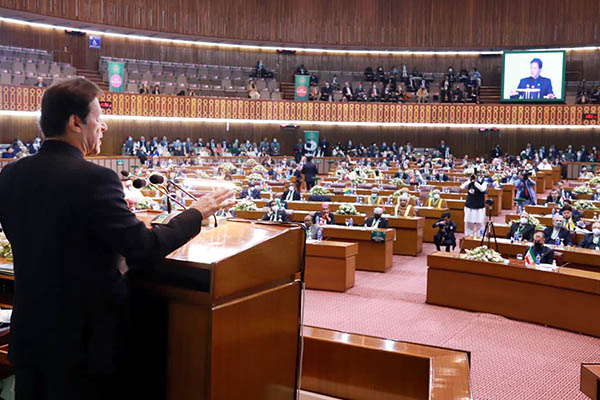
P.M. Imran Khan addresses the 17the Extraordinary Session of the OIC Council of Foreign Ministers in Islamabad. Photo courtesy PID
Joint resolution doesn’t offer many specifics but agrees to form Humanitarian Trust Fund to enable direct aid
The Organization of Islamic Cooperation (OIC) on Sunday pledged to work with the U.N. to unfreeze the millions of dollars in Afghan assets that have been blocked pending the Taliban regime’s fulfillment of an inclusive government and equal rights for all citizens.
A special meeting of the 57-member Muslim bloc, held in Islamabad, said it would work to “unlock the financial and banking channels to resume liquidity and flow of financial and humanitarian assistance.” It said the Islamic Development Bank would head the effort to free up assistance by the first quarter of 2022. Recognizing the disproportionate impact Afghanistan’s humanitarian crisis could have on its neighboring countries, the OIC foreign ministers said that the IDB would head a Humanitarian Trust Fund that would channel humanitarian assistance to Afghanistan including in partnership with other international actors. It urged all OIC member states, Islamic financial institutions, donors and other international partners to announce pledges to the Humanitarian Trust Fund for Afghanistan as well as to provide humanitarian assistance to the country.
The resolution also reiterated that the Taliban should abide by “obligations under international human rights covenants, especially with regards to the rights of women, children, youth, elderly and people with special needs.” It decided to form a team of international Muslim scholars to engage with the Taliban on various issues, including tolerance and moderation in Islam, equal access to education and women’s rights in Islam. It noted the urgent need to support Afghanistan in addressing poverty, creating employment opportunities, and provision of essential services to its citizens, in particular food, clean water, quality education, health services and decided to launch an Afghanistan Food Security Program. In this regard, the Islamic Organization for Food Security was requested to undertake necessary work using the capacity of its Food Security Reserves, when necessary.
The OIC members noted the necessity to continue economic cooperation with Afghanistan to improve its humanitarian situation, and called for the implementation of large-scale energy, transport and communication projects including the TAPI pipeline and the Turkmenistan-Afghanistan-Pakistan electricity transmission line to create opportunities for increasing social well-being of the Afghan people. They also stressed that the Afghan territory must not be used as a base or safe haven for any terrorist group.
The resolution called for the global community in general, and the U.N. Security Council in particular, to ensure that existing targeted sanctions did not impede the provision of humanitarian aid or economic resources to preserve institutions, schools and hospitals in Afghanistan and to allow multilateral development institutions, United Nations agencies, funds and programs and other humanitarian organizations to channel existing assistance and assets towards humanitarian assistance. It stressed that Afghanistan’s access to its financial resources would be pivotal in preventing a collapse and in reviving economic activity.
The OIC also decided to engage with the World Health Organization and other relevant stakeholders to secure vaccines as well as other medical supplies, technical and related assistance for the people of Afghanistan in the context of COVID-19 pandemic and other persistent and emerging health concerns.
The 31-point OIC resolution was short on specifics and gave no figure for financial assistance. There was also no progress on the formal recognition of the Taliban government.
Heading for chaos
Earlier, during his keynote address to the 17th Extraordinary Session of the Council of Foreign Ministers of the OIC, Prime Minister Imran Khan warned that Afghanistan was “heading for chaos” if the global community did not take action immediately. “If the world doesn’t act, this will be the biggest man-made crisis which is unfolding in front of us,” he said, adding that the OIC had a “religious obligation” to help Afghans.
In a direct address to the U.S., he urged Washington to delink the Taliban government from the people of Afghanistan. Acknowledging that the Taliban had yet to fulfill their commitments to the international community to form an inclusive government and ensure women’s rights, Khan claimed the concept of human rights was “different” for every society.
“The city culture is completely different from the culture in rural areas … we give stipends to the parents of girls so that they send them to school [in Khyber-Pakhtunkhwa],” he said as an example. “But in districts bordering Afghanistan, if we are not sensitive to the cultural norms, then they won’t send them to school despite receiving double the amount. We have to be sensitive about human rights and women rights,” he added.
The prime minister noted that Pakistan was currently hosting over three million Afghan refugees, adding that country was also providing shelter to more than 200,000 refugees who had overstayed their visas. “The situation in Afghanistan means they can’t go back. We are already suffering from the impact of the COVID-19 pandemic. We are not in a position to deal with an influx of refugees,” he added.
In a press conference after the OIC meeting, Foreign Minister Shah Mahmood Qureshi claimed the Taliban believed they were “moving in” the direction of granting equal rights to women. Since the Taliban came into power in August, women have remained largely excluded from government employment, and secondary schools for girls have mostly remained shuttered. “They [Taliban] are saying ‘let us decide in our own time’,” he added.
